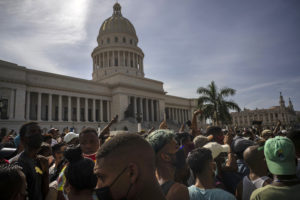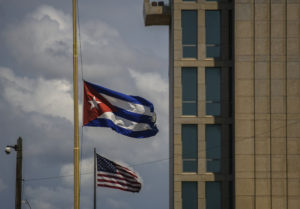WOLA Commentary
By Marc Hanson
Today marks the fourth anniversary of the arrest of Alan Gross in Cuba. Mr. Gross, a U.S. Agency for International Development (USAID) contractor, was implementing a “democracy promotion” program by distributing internet equipment to some groups in the Cuban Jewish community when he was arrested on December 3, 2009. Following his arrest, Mr. Gross was charged with “acts against the independence and territorial integrity of the state" and sentenced to 15 years in prison, a sentence that he is currently serving in a military hospital. The U.S. government has harshly condemned the arrest, detention, and treatment of Mr. Gross by the Cuban authorities.
There’s no question that Mr. Gross is in a difficult situation. While traveling on a tourist visa, he was actually working under contract for a U.S. government agency. He smuggled equipment into Cuba and sought to conceal his activities from Cuban authorities. While it’s not particularly surprising that he was arrested, other U.S. contractors working on similar “democracy promotion” programs and detained by Cuban authorities had simply been expelled from the country.
Positions on USAID programs on the island have hardened since the arrest. Havana continues to call for their cessation. In the meantime, Washington remains committed to the unwanted development assistance. And Mr. Gross is the casualty of the pitched political battle between the two.
His health has deteriorated, and he is cut off from his family; his wife Judy Gross has poignantly described the pain of their separation. (In recognition of his family's situation, in September 2011, WOLA urged the Cuban authorities to offer humanitarian parole to Mr. Gross.)
Every year, the State Department announces the anniversary of the detention, calling it “unjustifiable” and asking the Cuban government to release Mr. Gross from prison. State Department press releases have never referenced the role that the United States played in the affair by funding the work that resulted in Mr. Gross’s arrest. Furthermore, the Obama administration has given no indication that it is willing to pursue his release through negotiations. Not surprisingly, the Cuban government does not agree with the United States’ insistence that the imprisonment is unjustified, and it routinely rebuffs the pro forma public calls coming from State Department. However, according to lawyers representing the Gross family, the Cuban government is open to negotiating with the United States about the release of Mr. Gross.
Needless to say, Mr. Gross and his family are unsatisfied with U.S. officials’ current approach. To date, calls for his immediate and unconditional release have failed to win Mr. Gross his freedom. He remains in a Cuban prison, due to be released in 11 years at the age of 75. In a recent letter to President Obama, Mr. Gross wrote that “Officials in your administration have expressed sympathy and called for my unconditional release, and I very much appreciate that. But it has not brought me home.”
On the fourth anniversary of her husband’s arrest, Judy Gross is holding a rally in front of the White House to call on the president to take steps to facilitate his release. In an op-ed published in USA Today, she wrote, “I ask my country – Alan's country – the country he was serving – and my president: please do what it takes to bring my husband home.”
The Gross family isn’t the only party calling on the administration to act. Last month, 66 Senators sent a bipartisan letter urging the president to “act expeditiously to take whatever steps are in the national interest to obtain his release.”
Recommendations for the Obama administration
The administration’s annual calls to Cuban authorities to free Mr. Gross unconditionally have not worked, nor have any other diplomatic efforts they have undertaken. While administration officials insist that “some very senior people in this administration have put their minds and attention on trying to get Mr. Gross out of prison,” their current strategy has not succeeded in securing his release, and the current approach is unlikely to result in his release this year. An alternative approach to securing Mr. Gross’s release is not only warranted, it is long overdue.
This approach should incorporate the following elements:
2. Recognize the issues important to the Cuban government in any negotiation. First and foremost, these include the continuing imprisonment of a group of Cuban intelligence agents who were arrested, tried, and convicted in Miami in the late 1990s on a variety of espionage-related charges. The agents had infiltrated Cuban exile groups and worked as low-level employees on a U.S. military base. They were sentenced to long terms in U.S. prisons, ranging from 15 years to two life terms. Known as the Cuban Five, the agents became national heroes in Cuba, portrayed as defending Cuba against exile attacks from Miami. The Cuban government has been interested in their release since the time of their arrest. While the U.S. government should not necessarily be expected to simply release the Cuban agents, their situation—including sentences, probation, and current living situations—will continue to be a priority for Cuba, and the United States ought to recognize that reality.
Second, the “democracy promotion” programs in which Alan Gross was involved have long been considered provocations by the Cuban government. While the Obama administration has made a number of changes to these programs since the time of Mr. Gross’s arrest, their nature and character are likely to be an issue in talks over his release.
None of this is to suggest that the United States should simply accept Cuban demands. However, negotiations need to recognize the issues that are on the table, and all parties involved need to be willing to address them.
3. Take steps to improve the negotiating environment by decreasing the overall tension in U.S.-Cuban relations. The Gross case has not happened in a vacuum; the lack of trust on both the U.S. and Cuban sides is a consideration when it comes to any U.S.-Cuba policy issue. There are a number of concrete steps that the Obama administration could take that would help to reduce tension between the two governments. The administration could, for example, remove Cuba from the list of State Sponsors of Terrorism, a designation that is clearly inappropriate today. Or the U.S. government could moderate the impact of banking sanctions that recently made it impossible for the Cuban Interests Section in Washington to find a bank willing to establish a business account for their consular transactions and other legal activities. These modest, sensible steps would be useful in and of themselves and would also contribute to a climate that could help make negotiations over the Gross case more fruitful.
Kristel Mucino
WOLA Communications Director
kmucino@wola.org
(202) 797-2171


